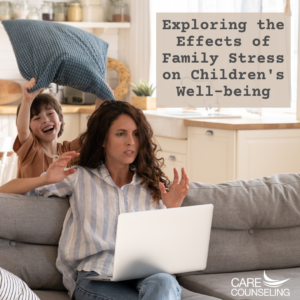Exploring the Effects of Family Stress on Children’s Well-being
 Family life is often described as the cornerstone of a child’s development, providing them with a foundation of love, support, and safety. However, families can also face various stressors that can impact children’s well-being. In this article, we will explore the effects of family stress on children’s physical, emotional, and psychological well-being, as well as strategies for managing and mitigating these stressors.
Family life is often described as the cornerstone of a child’s development, providing them with a foundation of love, support, and safety. However, families can also face various stressors that can impact children’s well-being. In this article, we will explore the effects of family stress on children’s physical, emotional, and psychological well-being, as well as strategies for managing and mitigating these stressors.
Understanding Family Stress
Family stress can arise from various sources, including financial difficulties, divorce, illness, parental conflicts, moving to a new home, and external pressures like work-related stress. It can manifest in different forms, such as parental arguments, economic strain, or emotional tension within the family unit. When not appropriately managed, this stress can significantly affect children.
Effects on Children’s Well-being
- Emotional and Behavioral Challenges
Children exposed to ongoing family stress may experience emotional and behavioral challenges. They may become more irritable, anxious, or fearful. These emotions can manifest in various ways, such as temper tantrums, withdrawal, or mood swings. In some cases, they may also exhibit regressive behaviors, like bedwetting or thumb-sucking.
- Impact on Academic Performance
Family stress can interfere with a child’s ability to focus and excel in school. It may lead to difficulties in concentration, lower grades, and an overall decline in academic performance. Chronic stress can also affect a child’s motivation to engage in learning and extracurricular activities.
- Physical Health Issues
Stress within the family can contribute to physical health problems in children. These may include headaches, stomachaches, sleep disturbances, and even weakened immune systems, making children more susceptible to illnesses. Chronic stress can also have long-term effects on cardiovascular health.
- Social Development
Children experiencing family stress may struggle in their social interactions. They might find it challenging to build and maintain friendships or exhibit aggressive behaviors when trying to cope with their emotions. This can impact their self-esteem and self-confidence.
- Coping Mechanisms
In response to family stress, children may develop unhealthy coping mechanisms, such as comfort eating, substance abuse, or self-harming behaviors. These coping strategies can have long-lasting negative effects on their physical and emotional well-being.
- Parent-Child Relationships
Family stress can strain parent-child relationships. Parents dealing with their own stressors may find it challenging to provide the emotional support and attention their children need. This can lead to a breakdown in trust and communication within the family.
Strategies for Managing Family Stress
- Open Communication: Create an environment where family members can express their feelings and concerns. Encourage children to talk about their emotions and provide reassurance and validation.
- Maintain Routines: Stability and predictability can be comforting for children. Try to maintain regular routines and schedules to provide a sense of security.
- Limit Exposure to Stressors: Shield children from unnecessary exposure to family stressors. This may include limiting their exposure to arguments or discussing sensitive topics when children are not present.
- Seek Support: Don’t hesitate to seek support from professionals when needed. Family therapy or counseling can help family members learn effective coping strategies and improve communication.
- Promote Self-Care: Self-care is not only for adults. Encourage children to engage in self-care practices like exercise, meditation, or spending time with friends to help reduce stress.
- Problem-Solving Skills: Teach children problem-solving skills to help them navigate difficult situations. Encourage them to brainstorm solutions and consider the consequences of their actions.
- Model Healthy Coping: Demonstrate healthy coping mechanisms for children by managing your own stress in a positive way. This sets an example for how they can cope with their own stress.
- Emphasize Resilience: Teach children the importance of resilience and the ability to bounce back from difficult situations. Remind them that setbacks are a part of life, and they can learn from them.
Fostering Resilience in Children
Resilience is a key factor in helping children cope with family stress. Here are some ways to foster resilience:
- Emotional Regulation: Teach children to identify and manage their emotions effectively. This can include deep breathing exercises or journaling.
- Problem-Solving Skills: Encourage them to think critically and develop strategies for solving problems, even when faced with stressors.
- Positive Relationships: Encourage positive relationships with peers and adults. Social support can be a powerful buffer against stress.
- Healthy Self-Esteem: Help children develop a positive self-image by emphasizing their strengths and abilities.
- Set Realistic Goals: Teach children to set achievable goals and celebrate their accomplishments, no matter how small.
Family stress can have a significant impact on children’s well-being, affecting their emotional, physical, and psychological health. It’s crucial for parents and caregivers to be aware of these effects and to take steps to manage family stress effectively.
By promoting open communication, maintaining routines, and seeking support when needed, families can create a more nurturing and resilient environment for children. Fostering resilience in children is essential for helping them navigate the challenges that family stress may bring and for providing them with the skills and support they need to thrive.



























